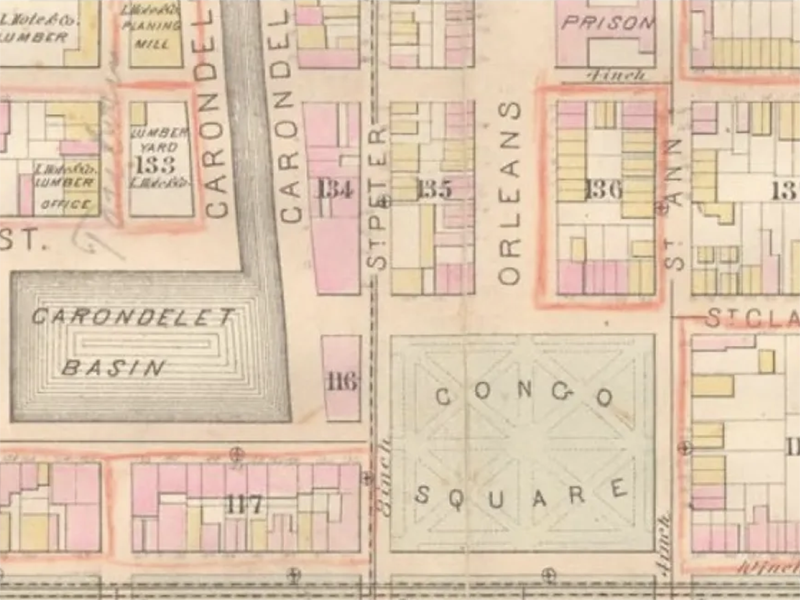Congo Square Connection

September 7, 2022
Tulane University’s Newcomb Institute’s Digital Research Interns worked as website developers on Congo Square Connection. The interns included Lucien Mensah, M. A., Wendy Yang, Kristen Osborne, Evan Henderickson, Rachel Tabor, and Winna Kai. The Congo Square Connection is a website designed to explain the history of Congo Square and its continuing education through local and international programs.
New Orleans’ Congo Square is in Louis Armstrong Park. This square was one of several Sunday gathering places in the city for enslaved Africans and their descendants during the 18th and 19th centuries. Over time, the inclusion of gatherers at Congo Square and other New Orleans locations with myriad New World musical experiences and influences yielded an intermingling of African-derived practices and European-based styles. These gatherings informed the evolution of new styles, indigenous New Orleans styles, African American music, and dance styles. Today, Congo Square serves as a viable touchstone for New Orleans’s popular culture, celebrated and enjoyed by citizens of all ethnic backgrounds in the city and around the world.
The website perpetuates the history and legacy of Congo Square, including its profound influence on the indigenous culture and dedicated cultural bearers of New Orleans. In addition, the site provides resources that advance the study of Congo Square worldwide in educational institutions at all levels and among the general public. It also promotes the work of cultural bearers and scholars and supports programs that promote Congo Square and related activities.
The Digital Research Internship program is where undergraduates gain technical and organizational skills and build a diverse portfolio of technology projects. Students working on a scrum team receive tangible experience in technology and feminist leadership while working on the digital humanities and digital scholarship projects of Tulane faculty in the humanities, social sciences, and sciences.
Students work in technical areas such as digital media, digital archiving, web design, database development, coding, design thinking, UX/UI, and audio/visual editing. This paid internship supplements students’ majors and minors when seeking employment or prestigious technology internships. All majors and skill levels are welcome to apply as long as you have an interest in feminist technology, working on a SCRUM team, and a willingness to learn with a group and independently. To learn more about other projects interns work on in 2022, take a look at Tech Initiatives, Volume 5, an in-house publication created by the interns.
The project partner was Freddi Williams Evans, author, independent scholar, and art educator internationally recognized for her scholarship on New Orleans’ Congo Square. Her book Congo Square: African Roots in New Orleans, the first comprehensive study of the location, received the 2012 Louisiana Humanities Book of the Year Award and was published in French. In addition, her research and advocacy for the historic landmark influenced the New Orleans City Council Ordinance that changed the location’s official name from Beauregard Square, named after Confederate General P.G.T. Beauregard in 1893, to the long-time popular name, Congo Square, in 2011.
The Congo Square Connection’s ultimate goal is to provide ongoing resources that will advance the study of Congo Square worldwide and act as an archive of work done by past scholars on Congo Square.
